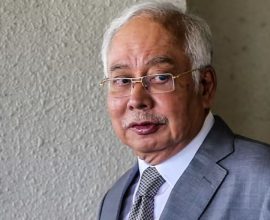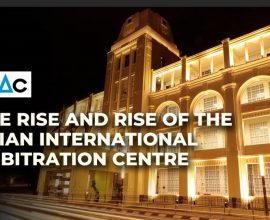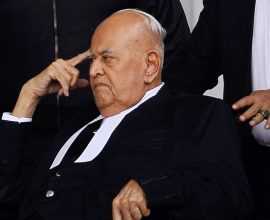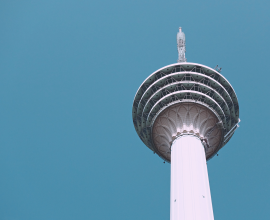Can a court grant a gag order?
When former prime minister Najib Razak was charged in court two days ago, the High Court, in the exercise of its criminal jurisdiction and powers, granted an interim gag order. Najib’s lawyer argued that Najib should not be ‘tried by the media.’ The order sought to stop public discussions over the charges pending against Najib. […]
When former prime minister Najib Razak was charged in court two days ago, the High Court, in the exercise of its criminal jurisdiction and powers, granted an interim gag order. Najib’s lawyer argued that Najib should not be ‘tried by the media.’ The order sought to stop public discussions over the charges pending against Najib.
The court said it would hear full arguments on the gag orders later. It nonetheless granted a temporary order.
A gag order restrains information from being disseminated. These are issued by the Government. Sometimes courts issue them too. Such orders can also stop comment from being made to—or by—the public.
When courts grant such orders, they are known as ‘super injunctions.’ They are ‘super’ for a number of reasons. One is that they restrict right to free speech and limit the constitutional guarantee of freedom of expression.
Gag orders are necessary in certain circumstances: to prevent the trade secrets of a company falling into the wrong hands; to protect ongoing military or police work. Indeed, they could be made to protect the rights of victims or children.
Do these circumstances apply in the cases that Najib was charged on July 04, 2018?
Constitutionalists argue that gag orders are unconstitutional.
This stance begins with the constitutional concept of freedom of expression, and leads to the question, how far can the press be muzzled?
Article 10 of the Federal Constitution guarantees freedom of expression. Incongruously, it also allows for a host of limitations on this right. This is what it says:-
Art. 10(1) Subject to Clauses (2), (3) and (4)—
(a) every citizen has the right to freedom of speech and expression;
Art. 10(2) Parliament may by law impose—
(a) on the rights [to freedom of expression] such restrictions it deems… in the interest of the security of the Federation…, friendly relations with other countries, public order or morality and restrictions designed to protect the privileges of Parliament or of any Legislative Assembly or to provide against contempt of court, defamation, or incitement to any offence.
Does any discourse over Najib’s current criminal charges pose any national security problem? Is Malaysia’s ‘friendly relations with other nations’ likely to be prejudiced because of this?
Is there now any problem with public order? Unless of course you consider a few women venting their frustrations at their own linguistic inabilities at the High Court premises an issue? Is anyone’s morality under siege? Is any Member of Parliament is being attacked over his privileges? Is there any defamatory statement alleged by anyone against Najib? Even so, are available remedies in defamation law able to deal with these issues?
Obviously, in August, the court has to decide whether any of these Constitutional restrictions exist.
When the interim gag order was issued was the court acting on its ‘inherent powers’? [Inherent powers are powers that are not written anywhere, but are able to be used by Courts, hence ‘inherent.’].
If so, there are several questions that should provoke your curiosity:-
First, ‘whether a court could use its inherent powers to restrain the constitutional right to freedom of expression?’
Second, ‘whether such an inherent power, when exercised, overrides or limits press freedom?
Third, ‘whether there was any urgent need to issue a gag order as there are already a slew of laws that will get the press into trouble if they overstep their lines of propriety?
Fourth, ’whether a court exercising criminal jurisdiction could grant a gag order?’
Fifth, ‘whether it was the duty of the press to report the national goings-on truthfully ?’
Finally ‘whether every citizen has a right to receive such news?’
These are all questions that will be ventilated when Najib applies for a permanent gag order in August 2018.
The outcome of this one order could change the legal landscape of Malaysian constitutional law. This case will have international repercussions, especially when it relates to the right to freedom of expression.
We now need move on to see how this phenomena of a ‘super-injunction’ has been treated in other countries. We should start with India because Article 19 of the Indian Constitution states pretty much the same thing as our Article 10(1). The Indian Art 19 states:-
‘19. (1) All citizens shall have the right— (a) to freedom of speech and expression.
Like Malaysia, India has its own limitation to Article 19(1). That is a clause in Article 19(2). It reads exactly like its Malaysian counterpart. It grants to Parliament the right to limit the right to freedom of expression.
How have Indian courts dealt with the right to freedom of expression where it involves press freedom?
The story starts with an activist director Ramesh Pimple. He produced a short documentary entitled ‘Aakrosh.’ It means ‘fury’. The video had a running time of 18 minutes. It dealt with the 2002 Gujarat riots. Omitting inflammatory images, the film sought to study the causes of the riot. It confined itself to portraying and dealing with the privations of the victims.
The Indian Central Board of Film Certification refused to grant Pimple a certification for its public exhibition. Pimple appealed to the Revising Committee, the Examining Committee and finally to the Film Certification Appellate Tribunal—all to no avail.
The Tribunal felt ‘… these riots are now history, and therefore, [can] be forgotten by public to avoid repetition of such cruel acts’. They deemed it a provocative documentary.
The Bombay High Court [(2004) (5) Bom CR 214] directed the Board to issue the certificate. AP Shah J who delivered the judgment of the Court quoted the celebrated passage from Sakal Papers (P) Ltd. v. Union of India [1962 AIR 305].
The dispute in Sakal Papers at first appeared wholly innocuous. The Indian Parliament had passed an Act [Newspaper (Price and Page) Act 1956] regulating the size and price of advertisements in the media. The Government issued an Order limiting the number of pages in a newspaper. Sakal Papers challenged the Government’s Order in court. A judge of the first instance, complying with the statue, upheld the Order. The Supreme Court took exception to this. It thought this order had limited the right to freedom of expression. It felt that this was press censorship.
Mudholkar J, writing for the Supreme Court a judgment that spoke words that shine to this day, even after 56 years. This is set out in full because it is important:-
‘… the Courts must be ever vigilant in guarding perhaps this most precious of all the freedoms guaranteed by our Constitution. The reason for this is obvious. The freedom of speech and expression of opinion is of paramount importance under a democratic Constitution which envisages changes in the composition of legislatures and Governments and must be preserved.
The interim order granted by the learned Single Judge is a blanket injunction. The order virtually amounts to a gag order or censorship of press. Such censorship cannot be countenanced in the scheme of our constitutional framework.
The fundamental right of freedom of speech is involved in these proceedings and not merely the right of liberty of the press. If this action can be maintained against a newspaper, it can be maintained against every private citizen who ventures to criticise the ministers who are temporarily conducting the affairs of the Government.
In a free democratic society those who hold office in Government and who are responsible for public administration must always be open to criticism.
Any attempt to stifle or fetter such criticism amounts to political censorship of the most insidious and objectionable kind the persons holding public offices must not be thin-skinned with reference to the comments made on them and even where they know that the observations are undeserved and unjust, they must bear with them and submit to be misunderstood for a time.
At times, public figures have to ignore vulgar criticisms and abuses hurled against them and they must restrain themselves from giving importance to the same by prosecuting the person responsible for the same.’
Example of Gag Orders
In the US, a court can make a gag order on individual parties to a litigation, effectively silencing them.
But what of the press? It is said that the courts in the US have no authority to stop the press from reporting a case. There the media may expose leaked information. In fact it can go the other way. It can be used to the media’s advantage. The papers can post negative information against a person issued a gag order, knowing that that the gagged person cannot comment on the reported news.
Statutes restrictive of the media have been struck down as unconstitutional time and time again.
The only time an exception has been made is in intellectual property cases. There, gag-orders have been upheld where there is an express gag provision in a legislation: e.g. in the WIPO Copyright and Performances and Phonograms Treaties Implementation Act.
Previous Regime’s attempts at gag orders
The previous regime is no stranger to imposing gag orders.
It made numerous attempts to prevent people speaking about the 1MDB scandal. These attempts are a matter of public record.
Members of the press, writers, and cartoonists have paid the price. Some journalists complained of receiving threats. Others were publicly attacked. In 2015 journalists who had asked awkward questions about the scandal were charged under what has been called the ‘colonial-era’ Sedition Act.
The Federal Court held that the Sedition Act was not unconstitutional.
In July 2015, Sarawak Report which led the 1MDB exposé had its web access blocked. Syed, a blogger who ran Outsyed the Box, had his site blocked. In late February 2016, the Malaysian Communications and Multimedia Commission (MCMC) banned the web-portal, Malaysian Insider. In late 2016, the office of the online portal Malaysiakini was raided.
If these were not acts of gagging legitimate dissent and aimed at oppressing a free press, what are?
Press freedom is a measure of Democracy
Malaysia ranks appallingly low on the World Press Freedom Index.
How democratic a state is, is easily measured by the degree of freedom enjoyed by the press. In a case involving the UK news giant, The Times, the House of Lords said: –
‘The proper functioning of a modern participatory democracy requires that the media be free, active, professional and enquiring.’
The House of Lords then said:
‘For this reason, the courts, here and elsewhere, have recognised the cardinal importance of press freedom and the need for any restriction on that freedom to be proportionate and no more than is necessary to promote the legitimate object of the restriction.’
Freedom of Expression includes a concurrent and reciprocal right to ‘receive information’
The right to free expression brings with it a concurrent, reciprocal right—the right to receive information without interference.
Any other interpretation of Article 10 of the Federal Constitution would negate Article 19 of the Universal Declaration of Human Rights which states: –
‘… the right to freedom of opinion and expression… includes [the right] to seek, receive and impart information and ideas through any media and regardless of frontiers.’
Without a free press, there cannot be a properly functioning democracy.
Without a free press, we would become— as we nearly became in the last decade—a dysfunctional state.
There is therefore an urgent need for proper and thorough reformation of the laws of press freedom in Malaysia.
Our national and state laws must be in harmony with, and amplify, fundamental guarantees and freedoms enshrined in the Federal Constitution.
When it comes to protecting the freedom of expression we must be world leaders. Like the laws of the most advanced nations, our laws must allow free reign to the press.
A law that places any power in the hands of the Government – or a judge – to issue a gag order or a ‘super injunction,’ must be subject to the strictest observation of constitutional safeguards.





